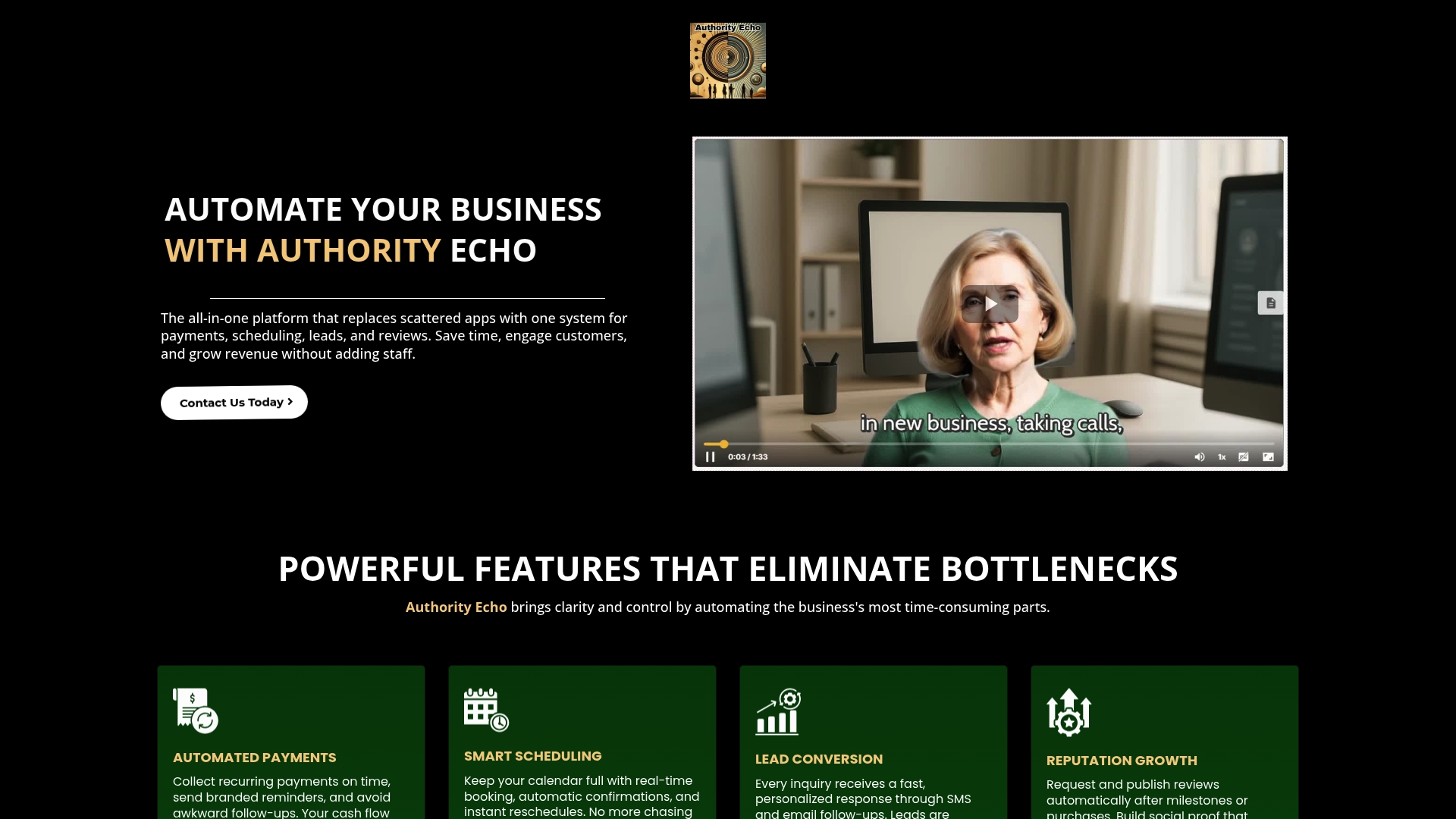Complete Guide to Online Lead Generation

Did you know that businesses spend billions every year on online lead generation to find customers who are actually interested in what they offer? In today’s digital world, attracting the right leads means more than gathering random emails. Companies need strategies that deliver real connections and measurable results. New tools and smarter tactics now help brands identify high-value prospects, making every marketing dollar count more than ever before.
Table of Contents
- What Online Lead Generation Means Today
- Major Types of Online Lead Generation Methods
- How Online Lead Generation Works For Small Businesses
- Benefits of Automation in Lead Generation
- Common Pitfalls and How to Avoid Them
Key Takeaways
| Point | Details |
|---|---|
| Focus on Quality | Modern lead generation prioritizes high-quality leads over large quantities, emphasizing meaningful interactions with potential customers. |
| Diverse Strategies | Successful businesses blend various methods like inbound, outbound, content marketing, and social media to attract their target audience. |
| Automation Benefits | Automating lead generation increases efficiency, scalability, and personalized targeting while reducing human error and operational costs. |
| Avoid Common Pitfalls | Prioritize lead validation, compliance, and timely follow-up to build genuine relationships and enhance conversion rates. |
What Online Lead Generation Means Today
Lead generation is no longer just collecting random contact information. According to Wikipedia, it’s a strategic process of creating consumer interest and capturing potential customer details for businesses seeking growth.
In today’s digital ecosystem, online lead generation represents a sophisticated approach to connecting businesses with potential customers who have demonstrated genuine interest. Cost per lead (CPL) has emerged as a critical online advertising metric, where advertisers pay specifically for explicit consumer sign-ups interested in their specific offer. This means businesses are no longer throwing marketing dollars into the void but investing precisely in potential customer interactions.
The modern lead generation landscape involves multiple strategic touchpoints:
- Targeted digital advertising
- Content marketing that provides genuine value
- Search engine optimization (SEO)
- Social media engagement
- Personalized email marketing campaigns
- Interactive website experiences
What makes contemporary lead generation powerful is its focus on quality over quantity. Businesses now understand that one highly qualified lead is exponentially more valuable than hundreds of generic contacts. Smart entrepreneurs are using AI-driven tools, advanced analytics, and personalized communication strategies to transform how potential customers discover, engage with, and ultimately choose their services.
Major Types of Online Lead Generation Methods
Online lead generation has evolved into a sophisticated ecosystem with multiple strategic approaches. According to Similarweb, businesses can leverage different methodologies to attract and convert potential customers, including inbound, outbound, and hybrid strategies.
These lead generation methods can be broadly categorized into several key types:
Here’s a summary of key online lead generation methods and their typical strategies:
| Method | Main Channels/Tools | Best For |
|---|---|---|
| Inbound Marketing | Blogs SEO Social Media |
Building trust Long-term growth |
| Outbound Marketing | Cold Emails Paid Ads Sales Calls |
Quick outreach Immediate results |
| Content Marketing | Ebooks Webinars Infographics |
Educating leads Brand authority |
| Social Media Generation | LinkedIn |
Networking Broad audience reach |
| Referral Marketing | Customer referrals Loyalty programs |
Trust-based leads Cost efficiency |
- Inbound Marketing: Attracting customers through valuable content, SEO, blogs, and social media engagement
- Outbound Marketing: Proactively reaching out through cold emails, paid advertising, and direct sales outreach
- Content Marketing: Creating and distributing valuable, relevant content to generate interest
- Social Media Lead Generation: Utilizing platforms like LinkedIn, Facebook, and Twitter to connect with potential clients
- Referral Marketing: Encouraging existing customers to recommend services to their network
As Semrush highlights, effective strategies often involve offering free trials, obtaining positive coverage beyond your website, and utilizing diverse online and offline channels. The key is understanding that no single method works universally—successful businesses blend multiple approaches tailored to their specific target audience and industry.
The most powerful lead generation strategies today are data-driven, personalized, and focused on providing genuine value.
Smart entrepreneurs recognize that modern leads aren’t just about collecting contact information, but about creating meaningful connections that solve real problems for potential customers.
How Online Lead Generation Works for Small Businesses
Online lead generation is a strategic lifeline for small businesses looking to compete in the digital marketplace. According to Uniqode, small businesses can effectively attract potential customers through targeted strategies like content marketing, search engine optimization, and social media marketing.
LocaliQ highlights several key techniques small businesses can implement to capture leads:
- Live Chat: Engage website visitors in real-time
- Lead Magnets: Offer valuable free resources in exchange for contact information
- Targeted Online Advertising: Create precise campaigns reaching ideal customer profiles
- Email Newsletter Signups: Build a direct communication channel
- Free Consultation Offers: Provide immediate value to potential clients
The core mechanism of online lead generation for small businesses revolves around creating valuable interactions that transform anonymous website visitors into potential customers. This means developing content that solves problems, designing user-friendly website experiences, and implementing strategic capture points that make potential customers want to learn more.

Successful small businesses understand that online lead generation isn’t about aggressive sales tactics. It’s about building trust, demonstrating expertise, and creating seamless pathways for potential customers to engage with your brand. By focusing on providing genuine value and making it easy for interested parties to connect, small businesses can transform their digital presence into a consistent lead-generation machine.
Benefits of Automation in Lead Generation
Lead generation automation is transforming how businesses approach customer acquisition, offering unprecedented efficiency and precision. According to research from arXiv, natural language generation methods are enabling advertisers to dramatically increase the volume and quality of online advertisements, highlighting the powerful potential of automated systems.
Key benefits of automation in lead generation include:
- Scalability: Ability to handle massive volumes of potential leads simultaneously
- 24/7 Engagement: Continuous interaction with potential customers regardless of time zones
- Personalized Targeting: Advanced algorithms that match leads with most relevant offerings
- Reduced Human Error: Consistent processing and qualification of leads
- Cost Efficiency: Lower operational expenses compared to manual lead generation
Research from arXiv demonstrates how dynamic intent guided meta networks can explicitly model user intent over time, enabling more sophisticated user engagement forecasting. This means businesses can now predict and respond to potential customer needs with unprecedented accuracy.
The true power of lead generation automation lies not in replacing human interaction, but in augmenting human capabilities. By leveraging intelligent systems that can analyze, segment, and nurture leads, businesses can focus their human talent on building relationships, crafting strategy, and closing high-value conversions. Automation transforms lead generation from a labor-intensive process to a strategic, data-driven approach that delivers measurable results.
Common Pitfalls and How to Avoid Them
Lead generation can be a minefield of potential mistakes that can derail even the most well-intentioned marketing strategies. Understanding these common pitfalls is crucial for businesses seeking to optimize their customer acquisition efforts.
Key challenges in lead generation include:
- Poor Lead Validation: As Wikipedia highlights, without proper validation, companies cannot accurately evaluate or improve their marketing campaigns
- Compliance Issues: Failing to adhere to marketing regulations can result in significant penalties
- Quantity Over Quality: Focusing on collecting large numbers of leads instead of targeting high-potential prospects
- Inconsistent Follow-up: Neglecting timely and personalized communication with potential leads
- Overlooking Data Privacy: Mishandling customer information and violating data protection standards
According to Wikipedia’s research on direct marketing, legal regulations like the CAN-SPAM Act mandate that consumers must be allowed to opt out of communications. This means businesses must design lead generation strategies that are not just effective, but also respectful of individual preferences and legal requirements.
The most successful lead generation approaches prioritize building genuine relationships over short-term gains. This involves creating transparent communication channels, offering real value to potential customers, and continuously refining your approach based on feedback and performance data. By treating lead generation as a collaborative process rather than a transactional one, businesses can create more meaningful connections and improve their overall conversion rates.
Transform Your Lead Generation Strategy Today
The “Complete Guide to Online Lead Generation” highlights how vital it is for small businesses to focus on quality leads, build trust, and automate follow-up processes to stay competitive. If you are struggling with inconsistent lead nurturing, poor lead validation, or managing scattered tools, you are not alone. These common challenges slow growth and cause potential customers to slip away just when your business needs them most.

Take control of your online lead generation with Authority Echo, a powerful all-in-one SaaS platform designed specifically for service-oriented small businesses. Authority Echo integrates AI-driven prospecting and personalized lead nurturing sequences into one seamless system. It will help you capture high-quality leads, engage prospects instantly with real-time chat, and boost conversions through automated follow-ups. Stop juggling multiple apps and start seeing measurable results like faster lead conversion and increased customer retention right now. Visit Authority Echo to begin accelerating your business growth today and experience how automation simplifies your daily operations.
Learn more about how our platform can help you automate your lead generation and streamline scheduling by exploring the Authority Echo Landing Page and start turning prospects into loyal customers immediately.
Frequently Asked Questions
What is online lead generation?
Online lead generation is the strategic process of attracting interest from potential customers and capturing their contact information for future engagement, primarily through digital channels.
What are the main types of online lead generation methods?
The main types of online lead generation methods include inbound marketing, outbound marketing, content marketing, social media lead generation, and referral marketing.
How can small businesses benefit from online lead generation?
Small businesses can benefit from online lead generation by implementing targeted strategies such as content marketing, SEO, and social media marketing to attract potential customers and build trust.
What are the benefits of automating lead generation?
The benefits of automating lead generation include scalability, 24/7 engagement with potential leads, personalized targeting, reduced human error, and cost efficiency, allowing businesses to focus on building relationships and strategic planning.




